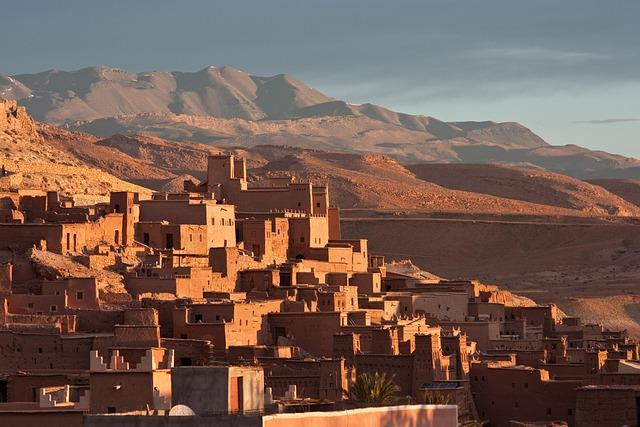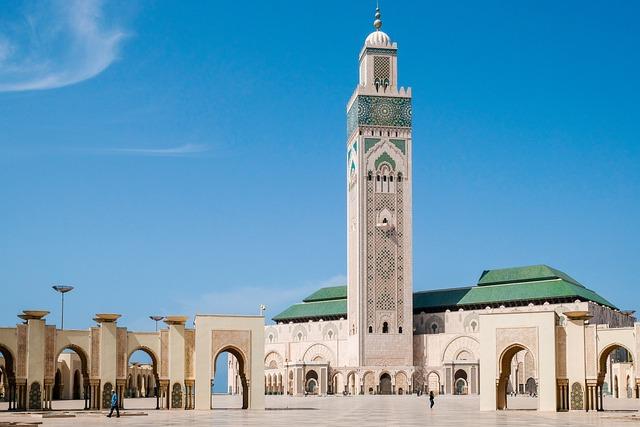Morocco assumes North Africa Vice-Presidency of AMCOW: A New Era in Regional Water Governance
In a meaningful development for regional cooperation in water management, Morocco has officially assumed the north African Vice-Presidency of the African Ministers’ Council on Water (AMCOW). This pivotal role underscores the country’s commitment to addressing the pressing water security challenges faced across the continent. As AMCOW plays a crucial role in advocating for effective water governance, policy formulation, and lasting resource management, Morocco’s leadership is poised to enhance collaboration among North African nations. This move not only reflects Morocco’s strategic ambitions within the region but also highlights the importance of unified efforts in tackling water-related issues that impact millions of lives. As nations grapple with the dual challenges of climate change and population growth, Morocco’s presidency signals a proactive approach towards fostering resilience and sustainable development in North Africa.
Morocco’s Strategic Role in AMCOW’s Leadership in North Africa
morocco’s ascension to the vice-presidency of AMCOW marks a pivotal moment in the country’s commitment to water security and sustainable development in the North African region. As a historically significant player within the African Union, Morocco aims to leverage its regional influence to champion collaborative initiatives that address pressing water challenges. This role enables Morocco to:
- Facilitate dialog among North African nations on transboundary water issues.
- Promote best practices in water management and governance across the region.
- Encourage investment in infrastructure that supports water accessibility and sustainability.
Under Morocco’s leadership,AMCOW is poised to enhance its strategic objectives,focusing on integrated water resource management and the implementation of the African Water Vision. This vision aims to ensure that all African citizens have access to safe,affordable drinking water and sanitation services. Key initiatives expected to be prioritized include:
| Initiative | Objective |
|---|---|
| Water Quality Improvement | Enhance monitoring and management of water resources. |
| Rainwater Harvesting Projects | Increase water availability in arid regions. |
| Regional Capacity Building | Strengthen local governance in water management. |

Implications of Morocco’s Vice-Presidency for Regional Water Governance
The selection of Morocco for the Vice-Presidency of AMCOW signifies a pivotal shift in regional water governance dynamics. This new role empowers morocco to play a leading part in addressing critical water issues that confront North Africa, which is experiencing significant challenges such as climate change, population growth, and increasing demand for water resources. As a outcome, Morocco’s leadership could facilitate collaborative efforts among neighboring countries, fostering an environment conducive to shared strategies and solutions. The nation’s experience in water management, notably through innovative practices like desalination and wastewater recycling, will serve as a benchmark for best practices in the region.
The implications of this role extend beyond merely national interests. With Morocco at the helm, the chance arises for enhancing regional cooperation on water-related policies. Key objectives might include:
- Promoting equitable access to water resources across borders.
- Facilitating data sharing and joint research initiatives to monitor water quality and availability.
- Aligning national policies with regional frameworks to tackle common water challenges.
Moreover, the country’s commitment to sustainable development could inspire a comprehensive approach towards water governance, ensuring long-term environmental health while addressing immediate needs. Such actions could lead to a unified regional stance on critical issues,ultimately improving resilience to water scarcity for millions across North Africa.

Key Initiatives Led by Morocco to Enhance Water Resource Management
Morocco has taken significant steps to address the pressing challenges associated with water scarcity and management, which are increasingly critical in North Africa’s changing climate. The goverment has initiated a series of transformative projects aimed at enhancing water resource management across the region, focusing on sustainable practices and international cooperation. Some of the key initiatives include:
- Integrated Water Resource Management (IWRM): Implementing comprehensive strategies that balance social, economic, and environmental needs.
- Investment in Desalination Technologies: Expanding capacities for seawater desalination to provide alternative water sources.
- rainwater Harvesting projects: Supporting local communities to enhance water retention through innovative techniques.
- Reforestation and Watershed Management: restoring critical ecosystems to maintain hydrological cycles.
Furthermore,Morocco’s commitment to collaboration is evident through its engagement with local and regional stakeholders,facilitating knowledge sharing and resource optimization. The country’s efforts extend to active participation in international forums focused on water security, where it aims to position itself as a leader in sustainable water management practices. Below is an overview of Morocco’s strategic collaborations:
| Partnership | Description |
|---|---|
| UNESCO Water Program | Cooperative projects aimed at enhancing water literacy and management. |
| African Development Bank | Investment in infrastructure to improve access to clean water. |
| World Bank Initiatives | Technical assistance and funding for sustainable projects. |
Recommendations for Strengthening AMCOW’s Impact under Moroccan Leadership
To enhance the effectiveness of the African Ministers’ Council on Water (AMCOW) under Morocco’s vice-presidency, several strategic recommendations can be implemented.Fostering regional collaboration is vital; Morocco should prioritize forming alliances with neighboring nations to tackle shared water management challenges. Establishing task forces that focus on specific issues, such as water scarcity and sanitation, can facilitate focused action and knowledge sharing. Additionally, strengthening partnerships with international organizations will secure funding and technical support, essential for implementing comprehensive water programs.
Moreover, a robust advocacy campaign is needed to raise awareness among stakeholders about the importance of effective water governance. This campaign should emphasize the integration of climate change considerations into water policies and promote sustainable practices at all levels. Investing in capacity-building initiatives for local leaders and technical staff will ensure that policies translate into actionable results at the grassroots level.implementing a obvious monitoring and evaluation framework will track progress, enabling timely adjustments to strategies, thereby reinforcing AMCOW’s role in securing water resources for future generations.

Challenges Ahead: Addressing Water Scarcity in North Africa
North africa is grappling with severe water scarcity, a challenge exacerbated by climate change and increasing population pressures. The region’s vulnerability to drought, coupled with inefficient water management practices, has led to a dire situation where access to clean water is becoming increasingly precarious. morocco’s ascension to the Vice-Presidency of the African Ministers’ Council on Water (AMCOW) marks a critical turning point in addressing these pressing issues.By leveraging this leadership role, Morocco aims to spearhead initiatives focused on sustainable water resource management, promoting cooperation among neighboring countries, and advocating for technology transfer in water-conservation practices.
Addressing water scarcity requires a multi-faceted approach, addressing both consumption patterns and systemic inefficiencies. Key strategies include:
- Improving Infrastructure: Upgrading existing water infrastructure to minimize leakage and promote efficient distribution.
- Implementing Sustainable Practices: Encouraging agriculture to adopt drip irrigation and other water-saving technologies.
- Enhancing Regional Cooperation: Facilitating collaborative policies and agreements among North African countries to manage transboundary water resources.
- investing in Research: Supporting innovations in water purification and reuse technologies.
The collective efforts of AMCOW, with Morocco at the forefront, can foster a united response to water scarcity that not only addresses immediate needs but also paves the way for long-term sustainability in North Africa. Through focused leadership and strategic initiatives, it is possible to mitigate the risks associated with dwindling water supplies and create a more water-secure future for the region.

Collaborative Opportunities for Sustainable Water Solutions in the Region
The recent elevation of Morocco to the vice-presidency of the African Ministers’ Council on Water (AMCOW) opens a significant gateway for collaborative efforts aimed at sustainable water management in the region. By leveraging its new position, Morocco can foster partnerships with neighboring countries to tackle pressing water challenges. These partnerships are essential for sharing best practices, technical expertise, and innovative solutions that enhance water resource management across North Africa.Stakeholders, including government agencies, NGOs, and private sector players, are encouraged to participate actively in this collaborative framework. Key areas of focus might include:
- Integrative water resource management – Uniting efforts across national borders to optimize water use.
- Knowledge sharing – Establishing platforms for exchanging successful strategies and lessons learned.
- Investment in technology – Promoting cutting-edge technologies that improve water efficiency.
- Capacity building – Training local communities and agencies on sustainable practices.
Furthermore,the potential for joint projects presents an opportunity to improve the resilience of water systems in the face of climate change. Collaborative initiatives can include infrastructure development proposals, cross-border water management policies, and enhanced funding mechanisms for sustainable practices. Building on Morocco’s leadership, regional stakeholders can prioritize actions that address both the immediate and long-term needs of water scarcity and quality issues. A comprehensive approach may involve:
| Collaborative Initiative | Expected Outcome |
|---|---|
| Joint Hydrological Studies | Identify shared water resources and protection strategies. |
| Regional Water Conferences | Encourage dialogue and cooperation among member states. |
| Water Conservation Campaigns | Increase awareness and promote sustainable water use. |
Wrapping Up
Morocco’s recent ascent to the Vice-Presidency of the African Ministers’ Council on Water (AMCOW) marks a significant moment for the nation and the broader North African region. This new role not only underscores Morocco’s commitment to addressing pressing water challenges in Africa but also positions the country as a key player in regional water governance and collaboration. As Morocco takes on this obligation, it will be crucial for the nation to leverage its expertise and resources to foster sustainable water management practices, promote innovative solutions, and strengthen partnerships across the continent. Observers will be keen to see how this leadership role influences regional water policy and contributes to achieving broader goals of water security and environmental sustainability in North Africa and beyond.







